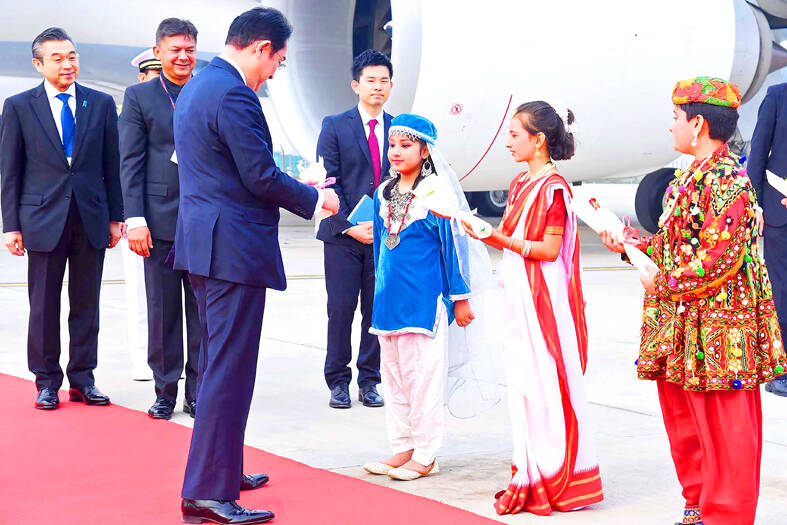Japanese Prime Minister Fumio Kishida yesterday announced a plan to promote an open and free Indo-Pacific, promising billions of US dollars in investment to help economies across the region in everything from industry to disaster prevention.
The plan, announced in New Delhi, is seen as Tokyo’s bid to forge stronger ties with countries in South and Southeast Asia to counter China’s growing assertiveness there.
Kishida also said Japan wanted Russia’s invasion of Ukraine to end as soon as possible and called on the “Global South,” a broad term referring to countries in Africa, Asia, Oceania and Latin America, to “show solidarity” after his talks with Indian Prime Minister Narendra Modi.

Photo: AFP / Indian Press Information Bureau
Kishida said there were four “pillars” to Japan’s new Indo-Pacific plan: maintaining peace, dealing with new global issues in cooperation with Indo-Pacific countries, achieving global connectivity through various platforms, and ensuring the safety of the open seas and skies.
Japan pledged US$75 billion to the region by 2030 via private investment and yen loans, and by ramping up aid through official government assistance and grants.
“We plan to expand the cooperation of the free and open Indo-Pacific framework,” Kishida told the Indian Council of World Affairs.
He emphasized the increasing connectivity among countries and promoting freedom of navigation, with an eye on increasing maritime defense and security among like-minded countries.
China has ramped up its military presence in the Indo-Pacific region and rapidly modernized its navy while promoting its Belt and Road Initiative.
“The kind of connectivity where you only rely on one country breeds political vulnerability,” Kishida said.
“We aim to increase the number of options each country has so that they can overcome these vulnerabilities and achieve further economic growth through connectivity,” he added.
“We will conduct joint maritime exercises with India and the United States, as well as goodwill exercises with ASEAN and the Pacific islands,” Kishida said.
Japan, India, Australia and the US are members of the so-called Quad group, created to balance China’s growing dominance. The four are to participate in the annual naval wargaming exercise Malabar to be held in Australia this year.
India and Japan have deepened their ties in defense and strategic affairs in the face of a dominant China.
“India is an essential partner when it comes to realizing our free and open Indo-Pacific vision,” Kishida later told reporters when asked why he chose New Delhi to announce his plan.
Modi said that strengthening the India-Japan “partnership is not only important for both our countries, it also promotes peace, prosperity and stability in the Indo-Pacific region.”

ROLLER-COASTER RIDE: More than five earthquakes ranging from magnitude 4.4 to 5.5 on the Richter scale shook eastern Taiwan in rapid succession yesterday afternoon Back-to-back weather fronts are forecast to hit Taiwan this week, resulting in rain across the nation in the coming days, the Central Weather Administration said yesterday, as it also warned residents in mountainous regions to be wary of landslides and rockfalls. As the first front approached, sporadic rainfall began in central and northern parts of Taiwan yesterday, the agency said, adding that rain is forecast to intensify in those regions today, while brief showers would also affect other parts of the nation. A second weather system is forecast to arrive on Thursday, bringing additional rain to the whole nation until Sunday, it

LANDSLIDES POSSIBLE: The agency advised the public to avoid visiting mountainous regions due to more expected aftershocks and rainfall from a series of weather fronts A series of earthquakes over the past few days were likely aftershocks of the April 3 earthquake in Hualien County, with further aftershocks to be expected for up to a year, the Central Weather Administration (CWA) said yesterday. Based on the nation’s experience after the quake on Sept. 21, 1999, more aftershocks are possible over the next six months to a year, the agency said. A total of 103 earthquakes of magnitude 4 on the local magnitude scale or higher hit Hualien County from 5:08pm on Monday to 10:27am yesterday, with 27 of them exceeding magnitude 5. They included two, of magnitude

CONDITIONAL: The PRC imposes secret requirements that the funding it provides cannot be spent in states with diplomatic relations with Taiwan, Emma Reilly said China has been bribing UN officials to obtain “special benefits” and to block funding from countries that have diplomatic ties with Taiwan, a former UN employee told the British House of Commons on Tuesday. At a House of Commons Foreign Affairs Committee hearing into “international relations within the multilateral system,” former Office of the UN High Commissioner for Human Rights (OHCHR) employee Emma Reilly said in a written statement that “Beijing paid bribes to the two successive Presidents of the [UN] General Assembly” during the two-year negotiation of the Sustainable Development Goals. Another way China exercises influence within the UN Secretariat is

Taiwan’s first drag queen to compete on the internationally acclaimed RuPaul’s Drag Race, Nymphia Wind (妮妃雅), was on Friday crowned the “Next Drag Superstar.” Dressed in a sparkling banana dress, Nymphia Wind swept onto the stage for the final, and stole the show. “Taiwan this is for you,” she said right after show host RuPaul announced her as the winner. “To those who feel like they don’t belong, just remember to live fearlessly and to live their truth,” she said on stage. One of the frontrunners for the past 15 episodes, the 28-year-old breezed through to the final after weeks of showcasing her unique